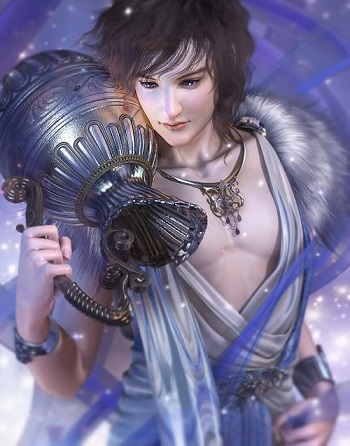Ganymede
This Erichthonius had a son Tros,
who ruled the Trojans, and Tros then fathered
three outstanding sons—Ilus, Assaracus,
and godlike Ganymede, the handsomest man
among all mortal men, so beautiful,
gods kidnapped him and made him cup bearer
to Zeus himself, so he'd live among immortals.
Homer, Iiad Book 20
In Greek mythology, Ganymede (Greek: Γανυμήδης, Ganumêdês)) was a divine hero whose homeland was the Troad. As a beautiful Trojan prince, son of eponymous Tros himself (or Laomedon?), Ganymede became Zeus's lover and cupbearer to the gods.
For the etymology of his name Robert Graves (The Greek Myths) offers ganuesthai + medea, "rejoicing in virility."
Story
Ganymede was kidnapped by Zeus from Mount Ida in Phrygia, the setting for more than one myth-element bearing on the early mythic history of Troy.
Ganymede was there, passing the time of exile many heros undergo in their youth, by tending a flock of sheep or, alternatively, during the chthonic or rustic aspect of his education, while gathering among his friends and tutors. Zeus saw him and fell in love with him instantly, either sending an eagle or assuming his own eagle nature to transport Ganymede to Mount Olympus.
Ganymede was Trojan not Greek, a fact of his origin that identifies him as part of the earliest, pre-Hellenic level of Aegean myth. Plato's Timaeus was of the opinion that the Ganymede myth had been invented by the Cretans— Minoan Crete being a power center of pre-Greek culture— to account for their pederastic lusts, which were imported thence into Greece, the Greek authors righteously agree.
Homer doesn't dwell on the erotic aspect of Ganymede's abduction, but it is certainly in an erotic context that the goddess refers to Ganymede's blond Trojan beauty in the Homeric Hymn to Aphrodite, mentioning Zeus' love for Trojan Ganymede as part of her enticement of Trojan Anchises.
The Roman poet Ovid adds vivid detail - and veiled irony directed against critics of male love: aged tutors reaching out to grab him back, and Ganymede's hounds barking uselessly at the sky (Carmina, x). Statius' Thebaid I:549 describes a cup worked with Ganymede's iconic mythos:
"Here the Phrygian hunter is borne aloft on tawny wings, Gargara’s range sinks downwards as he rises,
and Troy grows dim beneath him; sadly stand his comrades;
vainly the hounds weary their throats with barking, pursue his shadow or bay at the clouds."
In Olympus, Zeus made Ganymede his lover and cupbearer, supplanting Hebe. All the gods were filled with joy to see the youth, save Hera, Zeus' consort, who despised Ganymede.
Her hate of him was applied by mythographers to account for her abandoning the Trojans, an otherwise inaccountable shift in the alliances of the Trojan War, for the Troad was part of the homeland of the Great Goddess, of whom Hera was the main Olympian representative.
In a possible alternate version, the Titan Eos, dawn-goddess and connoisseur of male beauty, kidnapped Ganymede as well as her better-remembered consort, his brother Tithonus, whose immortality was granted, but not eternal youth.
Tithonus indeed lived forever but grew more and more ancient, eventually turning into a cricket, a classic example of the myth-element of the Boon with a Catch. Tithonus is placed in the Dardanian lineage through Tros, an eponym for Troy, as Ganymede.
Robert Graves (The Greek Myths) interpreted the substitution of Ganymede for Tithonus in a few references to the myth as a misreading of an archaic icon that would have shown the consort of the winged Goddess bearing a libation cup in his hand. (Compare the scholiast on Apollonius of Rhodes, iii:115; Virgil, Aeneid i:32; Hyginus, Fabula 224.)
Ganymede's father grieved for his son. Sympathetic, Zeus sent Hermes to Tros with two horses so swift they could run over water. Hermes also assured Ganymede's father that the boy was now immortal and would be the cupbearer for the gods, a position of much distinction.
The theme of the father recurs in many of the Greek coming-of-age myths of male love, suggesting that the pederastic relationships symbolized by these stories took place with the consent of the father.
Zeus later put Ganymede in the sky as the constellation Aquarius, which is still associated with that of the Eagle (Aquila).
In poetry, Ganymede was a symbol for the ideally beautiful youth and also for pederastic love, sometimes contrasted with Helen of Troy in the role of symbol for the love of women.
In Rome the passive object of a man's same-sex desire was a catamite (catamitus). The word is a corruption of Greek ganymedes but it has no mythological connotation in Latin.
When Ovid sketches the myth briefly (Metamorphoses x:152-161), "Ganymedes" retains his familiar Greek name.
[1]













